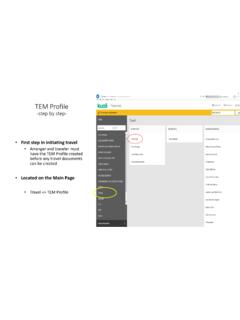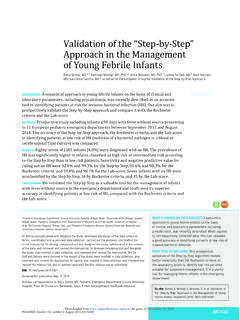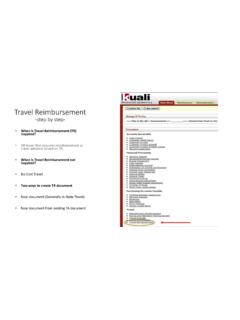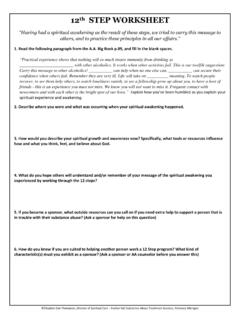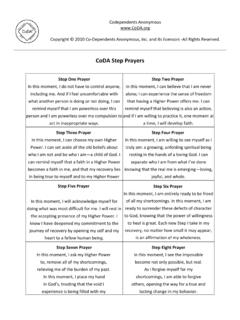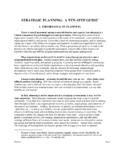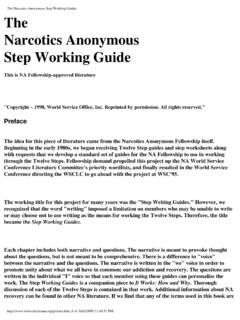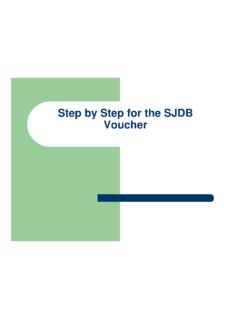Transcription of EDA Step Workbook - Eating Disordersanonymous
1 EDA step Workbook step 4 A Guide for EDA Members step Four Made a searching and fearless moral inventory of ourselves. In step 3, we made a decision to turn our will and our lives over to the CARE of God, as we understood God. Next we launched out on a vigorous course of action, the first step of which is personal housecleaning, which many of us had never attempted. (Big Book, Alcoholics Anonymous, p. 63 & 64) step 4 is where the rubber meets the road. It is the first tangible action step . It can seem like a monumental a searching AND fearless moral inventory .. but in its simplest terms it really is just about taking stock. What is working for us and what isn t? What are our assets and liabilities? Although many of us have led good moral lives, the content of our inner lives can be much different.
2 How judgmental are we? How much of our lives have we spent worrying about the future? How long have we carried around a resentment? You may have heard this before, but any business that doesn t take stock of its inventory on a regular basis is bound to fail. People need to take regular inventory of their assets and liabilities, too. Often, we hang onto behaviors and attitudes that once served a useful purpose but have long since turned into serious liabilities. Sometimes we develop wonderful traits -- patience with others, for instance, or a deeper appreciation for life -- but haven't really noticed these changes either. Taking stock of our personal assets and liabilities -- taking a good and honest look at our habits of attitude and action is half of what step 4 is all about. The other half involves figuring out a plan to keep the right stuff going and get the wrong stuff stopped.
3 You may wonder how we can possibly know if we have done a proper job with step 4. Some of us were such perfectionists we hardly knew where to begin, let alone end. How honest is "good and honest?" Were we even capable of real self-honesty? The truth is that nearly all of us were quite seriously crippled by fear, resentment and self-pity when we began our journey of recovery. step 4 is the searchlight that reveals these confounding bedevilments and helps us see what we must do to be rid of them. If we do a decent job with this step , we begin to see where we routinely invite muck into the house. We have a plan for how to get and keep our house clean. We are prepared for a serious house cleaning and we begin to feel free. We've already said step 4 means taking stock of our habits of thought and action, and making plans for replacing rotten ideas and behaviors with something better.
4 It is equally important to remember what step 4 is NOT. It is not about shaming ourselves. It is not just another creative way to abuse ourselves. St2 ep 4 is also not about other people. It is about looking at how we, individually, reacted to the world, NOT about what the world or individuals in it did to us. Though our decision was a vital and crucial step ( step 3), it could have little permanent effect unless at once followed by a strenuous effort to face, and be rid of, the things in ourselves which had been blocking us. (Big Book, Alcoholics Anonymous, ) Most of us have spent our whole lives trying to get away from the turmoil inside by bingeing, purging, starving, engaging in perfectionism, people-pleasing, and more. We thought if we could run fast enough or work hard enough we could get away from ourselves.
5 step 4, therefore, demands great courage from each us. Individually, we must make a decision to turn around and look directly at all those things we have been avoiding. Though we must do this for ourselves and by ourselves, we are never truly alone; we are standing on the shoulders of those who have gone before and we stand shoulder to shoulder with one another, taking responsibility for our lives at last. This may all sound quite awful, but step 4 can be a very gentle process if done in the right frame of mind. Please try and remember that as you embark on this part of the journey. We have abused ourselves long enough. step 4 is part of the natural continuum of healing that you began with the first three Steps. Different EDA Members step Four Experiences: I will say that I had probably been writing my 4th step in my head for the last month, but as soon as I actually started actually writing, it got so much better and easier to do.
6 It isn't completed yet and I am sure that I will constantly find more stuff to add until I meet with the person that will hear my fifth step , but it will be so much easier to add to a project that has already been started. I also know that I can do another Fourth step later if I need to, it doesn't have to be perfect and 100% complete this time as long as I am honest. The 4th and 5th Steps are like the hump day of the workweek. Get past these and you're well on your way to the weekend. There are lots of guides to doing an inventory and I think everybody has to find the one that suits them. I remember being totally confused and overwhelmed by this step . But when a sponsor really got across to me that this is like a business looking at its shelves and seeing what is there and what is not there, objectively and thoroughly, I got started.
7 It isn't about blame or shame. It is about looking for and seeing what character traits, habits and thinking brought us to where we are. I was told that getting past the 4th and 5th meant going forward a whole stage in recovery. If you're tired of relapsing, get past these two steps. I've found this to be true not only for myself, but for others I've seen recover. So just get started on the 4th. Don't be afraid of it. 3 Now I actually do this on a daily basis whenever possible, as situations arise. I think before acting and try not to react. For me this step is like the essence of mindfulness, a Buddhist principle. Basically, you take a step back from the moment to observe it as if from the outside without judging or reacting. Once you master this you will be able to observe the situation from your own point of view, and that of others, and understand the reality of motives and emotions, and how you are reacting to them.
8 Praying for the willingness to start and complete this step was the only way I could continue my recovery. With my Higher Power s and sponsor's support I was able to take an honest, searching and fearless inventory of myself. When finished, I stared at the paper that used to be blank. I thought to myself, Here are all of my secrets down on paper. I had a strange sort of relief as if I wanted to get rid of these character defects , ASAP! I prayed again for God to provide me with the willingness to share this with my sponsor and trust her with my secrets in step Five. The point of the 4th step is to not justify our ill thinking and behavior, but to see where we (I) -- not other people -- went wrong, so we (I) don't have to wallow in misery and pain in the same way again, and so we (I) don't have to go around blaming other people for our (my) misery.
9 That attitude of blame and the accompanying (sometimes unrecognized) feeling of victimization and self-pity, keep us stuck for as long as we hold onto them; they are the shackles of helplessness and of powerlessness. Well, the point of the steps, according to the Big Book, is to help us find a power by which we can lead sane and useful lives. step 4 is where we cut those shackles that bind us to powerlessness. Suggestions: 1. Get a notebook or journal just for the purpose of doing this step . Keep it in a safe place. 2. This step is meant to take a while. How long depends on how thorough you are willing to be. It is best not to try and complete a Fourth step in one sitting. 3. Pray each time before you start writing. Asking your Higher Power to help you be fearless and thorough can be enough.
10 4. Don t go back and read what you have written and edit. Whatever comes out of your pen is what needs to be on the paper. 5. Make sure you have a sponsor to help you when you get stuck, or let your support people know what you are doing and ask for their support. 4 Exercises: A.) Resentments: 1. Make a list of the resentments you have, or had, if this is your first time through the steps, on the left side of the paper leaving room on the right side and under each resentment for the second, third and fourth parts of this exercise. Write down the names of people, groups of people, institutions, anything you have resentment about. Resentments can be recognized as memories that have a sting to them. Write down the names of the people you hold responsible for the sting in these memories.


